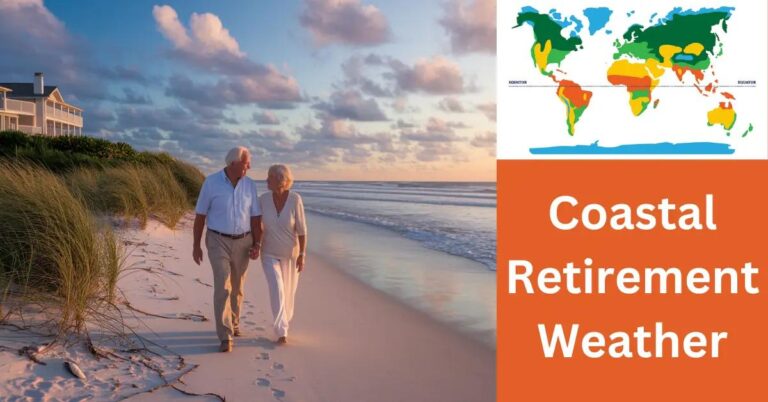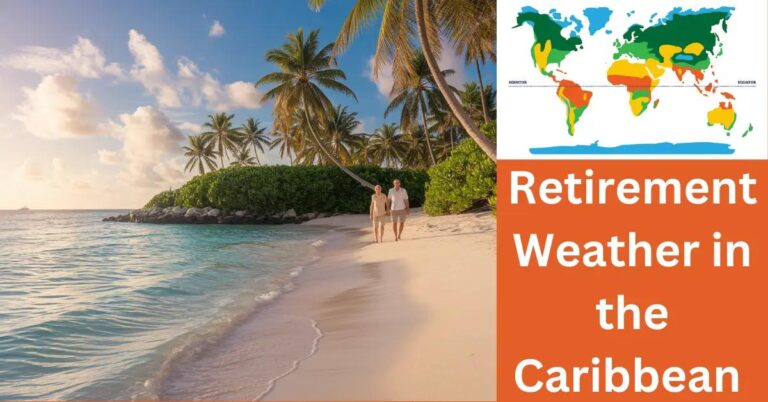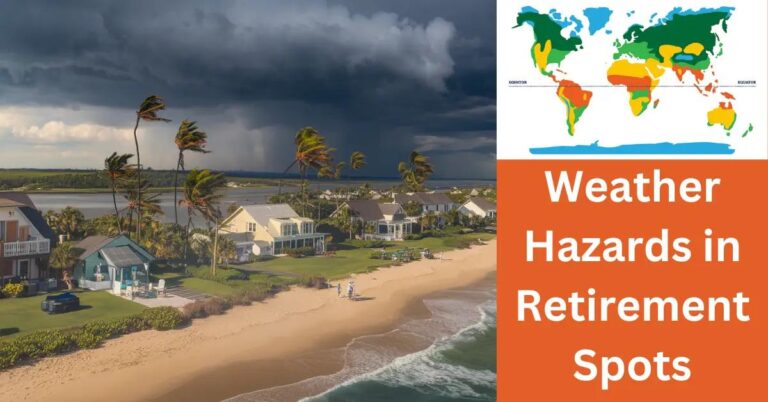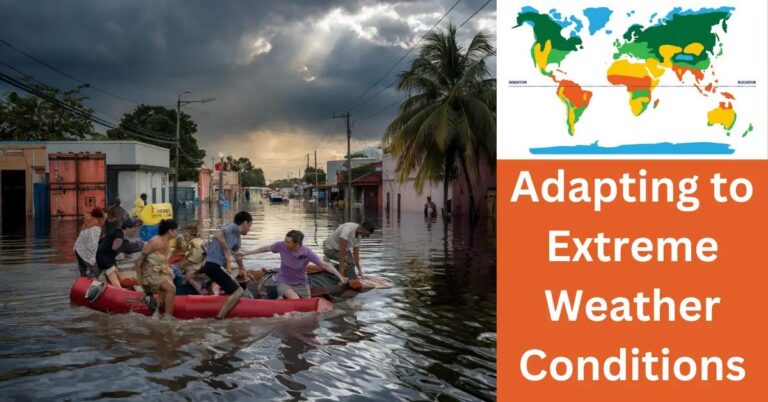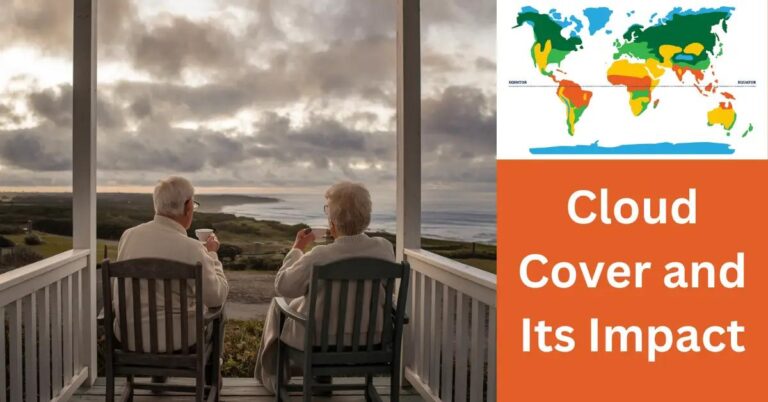TL;DR:
- Hurricanes affect retirement destinations by lowering property values and increasing repair costs.
- The hurricane season runs from June to November, with areas like Florida being frequently hit, although cities like Orlando are less affected.
- Evaluating hurricane risks and property elevation in coastal areas is vital for retirees.
- Financial planning for hurricane-prone areas requires insurance check, construction investments, and an emergency fund.
- Utilize technology for real-time updates and disaster recovery; trust modern tech and local authorities for safety.
- FEMA and state programs provide post-hurricane financial aid; community and faith groups offer additional support.
- Have a hurricane readiness checklist and personal emergency kits, and stay informed through trusted sources like the National Hurricane Center.
Hurricanes can seriously impact your retirement paradise. If you're eyeing sunny shores, it's crucial to weigh the risks of stormy weather. How do these natural events affect your dream spot? Property values can tumble, flood risks loom large, and planning becomes tricky. Before making a move, understand where safer communities exist and what's needed to stay protected. Whether fleeing to Florida or a coastal retreat, grasping these realities safeguards your splendid retirement adventure. Ready to dive deeper? Let's explore!
How do hurricanes impact popular retirement destinations?
Hurricanes pose a real risk to popular retirement spots. But why worry? The impact on property values can be big. After a storm, homes may lose value. Repairs can also cost a lot.
When choosing a place to retire, think about the weather. Consider hurricane season and timing. The season lasts from June to November. During this time, the chance of a hurricane is high.
Not all places face the same risks. There are parts of Florida that rarely get hit. For example, cities like Orlando see fewer hurricanes. But is it the best state for nice weather? Some might say yes. Florida offers warm weather year-round. No snow, just cozy sunshine.
But don't only look at warmth. Evaluate real estate risks and opportunities. A hurricane risk assessment can help decide where to live. Hurricanes are rated in categories from 1 to 5. A Category 5 is the strongest. It can destroy homes and cause flooding. Understanding these categories helps in planning.
Hurricane frequency varies across spots. The Gulf Coast often sees more storms. The Carolina coasts are not far behind. A retiree must wonder if the home's view is worth the risk.
Also, seasonal weather affects retirement plans. Storms may disrupt travel. They can damage roads or close airports. Planning vacations during hurricanes is tricky.
In closing, while hurricanes impact places, planning helps a lot. Investigate the area's storm history. Check how often storms hit. Weigh benefits of sunshine against rain and wind risks. This way, make a sound choice about where to spend golden years.
What Safety Considerations Should Retirees Account for in Coastal Areas?
Which side of Florida is safer from hurricanes? The Gulf Coast generally faces fewer hurricanes than the Atlantic side. Living in Florida offers sun and beaches, but hurricanes are a concern. Coastal areas, especially the Atlantic side, have more frequent storms. Why? Warm ocean waters fuel hurricanes, making the Atlantic a hot spot.
Living near the coast means considering storm surge and flood risks. Storm surges push seawater onto land, causing flooding. Low-lying areas are most at risk. Retirees should assess how high above sea level their home is. Flood maps help show which areas flood the most. This can be a big factor for those choosing safe retirement communities.
When evaluating the safety of retirement communities, know the local hurricane plan. Communities with solid hurricane plans can offer peace of mind. Ask how often these plans are updated. Reliable communities run regular hurricane drills. Secure evacuation routes are a must. This ensures less stress during storm season.
Living in hurricane regions has pros and cons. On the positive side, coastal areas offer beautiful views and relaxing lifestyles. Ocean air can be invigorating. On the downside, there is potential property damage and the need for evacuations.
Choosing a retirement home demands looking at both beauty and risk. Consider past hurricanes in the area; some places rebuild quickly, others struggle. Whether you're in Florida or another coastal state, taking these steps makes for safer retirement. You can view Florida’s flood map for more information, which helps understand your risks better.
How Can Retirees Prepare and Respond to Hurricane Threats?
Preparing for hurricanes is key for retirees living in at-risk areas. Let's dive into how you can ensure your safety during hurricane season.
Where is the best place to retire to avoid climate change? The safest choice might be areas less prone to hurricanes and flooding, such as parts of the Midwest. While these spots offer less hurricane risk, they lack coastal views and weather.
Safety begins with having a hurricane readiness checklist. This list should include vital tasks and items like securing shutters, storing non-perishable food, and charging devices. Gathering essential items ahead of time prepares you for any situation.
Developing evacuation plans for the elderly is smart. You should plan your route and decide your destination. Remember to account for health needs and mobility issues. Practice your evacuation plan with family so everyone stays safe and informed.
Personal emergency kits are lifesavers. Each kit should have bottled water, canned food, first aid supplies, flashlights, and important documents. Keep your medical information and medication list up-to-date in this kit.
Disaster preparedness for seniors needs special safety tips. Know your neighbors and stay connected to your community. Contacts are invaluable resources in emergencies. Ensure communication devices work and have backup charging options.
Investing in technology can also keep you safe. Apps can track hurricanes and send alerts. These tools help you decide when it’s time to evacuate or take cover.
Being ready for a hurricane might seem daunting, especially without family and community support. By taking these steps, you boost not only your safety but also your peace of mind.
What are the financial implications of living in a hurricane-prone area?
When you think about retiring in a hurricane-prone area, the financial side is key. Let's dive into insurance first. Evaluating hurricane insurance for retirees is crucial. You need to check if your insurance policy covers all possible storm damages. Some policies might not cover everything, so it's important to scrutinize the fine print.
Now, let's talk about the cost of hurricane-proof construction. This can be a big expense but think of it as an investment. Strengthening your home can save you lots of money later. Windstorm shutters, reinforced roofs, and impact windows are common features in hurricane-prone areas. They might raise your home's value too.
Estimating rebuilding costs after hurricanes can be tricky. Costs can range widely depending on materials and labor rates in your area, but planning for the worst can ease future burdens. Keep an emergency fund ready to handle these unforeseen expenses.
Adaptive measures for hurricane-prone financial planning are vital. It's about being ready for the unpredictables. Building a budget that accounts for potential damages should be a priority. Consider reviewing your expenses to allocate funds for post-hurricane needs.
Finally, let's touch on relocation strategies post-hurricane. Sometimes, the best choice might be to move. If damages are too significant, or if the area is no longer safe, moving is necessary. Understand relocation costs and keep this potential scenario in mind as you plan. It’s a good idea to research different locations that aren't prone to storms for this purpose.
Planning and understanding these financial implications will help you navigate the challenges of living in a hurricane-prone area more confidently.
How Can Modern Technology Assist in Hurricane Risk Management?
Modern technology plays a key role in hurricane risk management. With advancements in hurricane tracking and prediction, we now get real-time updates. This means people can prepare better for storms. New tools can pinpoint a storm's path more precisely, helping us know when and where it might hit. For instance, satellite imagery shows us detailed data about a storm's strength and movement. You might wonder, how effective are today's hurricane warning systems? They've improved so much that alerts are now sent quickly and clearly to those in danger. This rapid communication saves lives by giving people time to act.
You might ask, should we trust technology and local authorities during hurricanes? My answer is yes. Modern systems have enhanced accuracy, and local authorities rely on these to make informed decisions. Trusting them and their technology means trusting in your safety.
Technology also boosts community-driven disaster recovery. After a storm, online platforms help connect those in need with volunteers. Apps allow neighbors to share resources and information. Technology encourages communities to rebuild faster and stronger.
Hurricane safety protocols have improved thanks to these technologies. With better data, we can evaluate these protocols to ensure they meet current needs. Updated safety measures include advanced evacuation strategies and more rigorous building guidelines.
Whether it’s predicting a storm's path or speeding up recovery, technology is an ally. For those retiring in hurricane areas, staying informed through such technology is vital. Exploring advanced technology resources can arm you with the tools to face storms with confidence. To understand more about specific cutting-edge tools and how they can help, you can visit reliable sources tailored for hurricane risk management.
What Support Systems are Available for Retirees Post-Hurricane?
"What government help can I get after a hurricane?" you might ask. The first place to look is FEMA, the Federal Emergency Management Agency. FEMA offers grants for home repairs and temporary housing. Retirees can also apply for funds to cover medical needs. To apply, visit the FEMA website or call their helpline. States often have their own relief programs, so check with local agencies, too.
Community support plays a big role in disaster response. Neighbors often become first responders. After a hurricane, community centers may offer shelter, food, and water. People gather to donate clothes, share meals, and offer comfort. Faith-based groups are active as well, providing support and care.
"Where should I find trustworthy hurricane news?" Staying informed is key. National Hurricane Center (NHC) provides updates. They track hurricane paths and strength. Local news channels report on severe weather setups. Social media can help, but verify information with trusted sources like Red Cross.
"How can retirees bounce back after a hurricane?" Recovery options include rebuilding homes or relocating. Look into federal aid or low-interest loans. Charities like the Red Cross and local groups often give funds or assistance. Post-disaster counseling can aid emotional recovery, too.
It's crucial to explore recovery options early. Plan for what's next. Consider community resources, trusted news sources, and government aid for peace of mind. Retirees should network with neighbors and local groups for support. Take steps now to protect and recover efficiently in times of need.
Conclusion
Hurricanes can change retirement plans by impacting property values and safety in coastal areas. Before settling, study local weather, evaluate real estate risks, and understand hurricane patterns. Prepare for storms with solid safety plans, insurance, and emergency kits. While living in hurricane-prone regions has its risks, it offers unique beauty and lifestyle perks. Modern technology helps track storms and guide evacuation plans. Also, utilize community networks and government aid for recovery. With the right planning, retirees can enjoy coastal living while staying secure.



